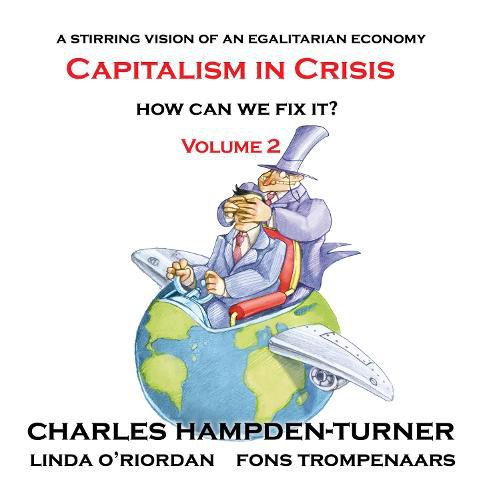Readings Newsletter
Become a Readings Member to make your shopping experience even easier.
Sign in or sign up for free!
You’re not far away from qualifying for FREE standard shipping within Australia
You’ve qualified for FREE standard shipping within Australia
The cart is loading…






This title is printed to order. This book may have been self-published. If so, we cannot guarantee the quality of the content. In the main most books will have gone through the editing process however some may not. We therefore suggest that you be aware of this before ordering this book. If in doubt check either the author or publisher’s details as we are unable to accept any returns unless they are faulty. Please contact us if you have any questions.
There are two volumes to Capitalism in Crisis. Volume 1 investigates what has gone wrong. Volume 2 responds to the challenge laid down in Volume 1.
In Volume 1, we argued that shareholders and the financial sector of the economy had become severed from stakeholders within companies who do the work and create the wealth we all enjoy. This has led to gross inequality with declining rewards for those working in the real economy on productive tasks. In turn, this has reduced wages and diverted funds from the most important contributors. We are less productive and innovative as a consequence.
In this volume, we will address the subject of values. We will argue that values have scientific and verifiable meanings and it is possible to determine with great accuracy the kind of valuing that contributes to our integrity and the values that tear us apart. We criticise the contention of positivists that values are entirely subjective, have no testable meaning and are mere matters of taste, like the taste buds on tongues. We believe this doctrine has betrayed generations of students and must come to an end. Once we have restored values to their proper place, we will see who in our society creates wealth and value and who does not, who threatens democracy and who supports it. All values are really differences, and we need to reconcile these differences to remain civilized and in dialogue with one another.
$9.00 standard shipping within Australia
FREE standard shipping within Australia for orders over $100.00
Express & International shipping calculated at checkout
This title is printed to order. This book may have been self-published. If so, we cannot guarantee the quality of the content. In the main most books will have gone through the editing process however some may not. We therefore suggest that you be aware of this before ordering this book. If in doubt check either the author or publisher’s details as we are unable to accept any returns unless they are faulty. Please contact us if you have any questions.
There are two volumes to Capitalism in Crisis. Volume 1 investigates what has gone wrong. Volume 2 responds to the challenge laid down in Volume 1.
In Volume 1, we argued that shareholders and the financial sector of the economy had become severed from stakeholders within companies who do the work and create the wealth we all enjoy. This has led to gross inequality with declining rewards for those working in the real economy on productive tasks. In turn, this has reduced wages and diverted funds from the most important contributors. We are less productive and innovative as a consequence.
In this volume, we will address the subject of values. We will argue that values have scientific and verifiable meanings and it is possible to determine with great accuracy the kind of valuing that contributes to our integrity and the values that tear us apart. We criticise the contention of positivists that values are entirely subjective, have no testable meaning and are mere matters of taste, like the taste buds on tongues. We believe this doctrine has betrayed generations of students and must come to an end. Once we have restored values to their proper place, we will see who in our society creates wealth and value and who does not, who threatens democracy and who supports it. All values are really differences, and we need to reconcile these differences to remain civilized and in dialogue with one another.